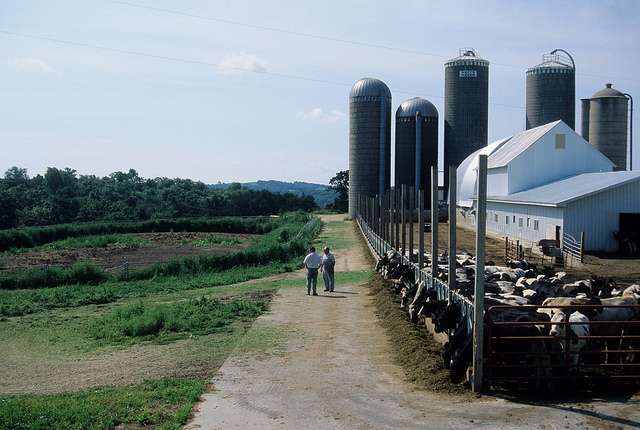Trump’s Aid to Farms Gets Mixed Reviews
Dairy farms badly hurt by tariffs, Trump offers $12 billion national handout to farmers.

Dairy farm. Photo from the Wisconsin Department of Natural Resources (CC-BY-ND).
Wisconsin’s agricultural trade associations had a mixed reaction to President Donald Trump’s promise of $12 billion in aid for farmers impacted by his trade war with foreign countries. While there was appreciation for the funding, the groups say members want trade not aid.
U.S. Department of Agriculture Secretary Sonny Perdue announced a series of three programs that will funnel $12 billion to farmers who have seen commodity prices drop since Trump started placing import tariffs on foreign goods. Those tariffs in turn sparked retaliatory tariffs on U.S. products, many of which are agricultural. On a conference call with reporters, Perdue said the payments will help farmers deal with instability with commodity prices caused by what he described as illegal retaliatory tariffs from other countries.
“This obviously is a short-term solution that will give President Trump time to work on a long-term trade policy and deal to benefit agriculture as well all sectors of the American economy,” said Purdue.
But in Wisconsin, farm and agricultural trade groups wondered how long it will take for that new trade policy to be hammered out and whether $12 billion would be enough to help every impacted farmer.
Wisconsin Soybean Marketing Board Executive Director Robert Karls said it’s a frustrating situation for farmers who would rather see a fair and level playing field rather than a situation where they’re dependent on a government aid program. He said soybeans have already lost more than $2 a bushel in value over the last 45 days, which will eventually impact everyone.
Wisconsin’s dairy farmers have also been hammered by trade impasses with countries like Mexico and China, said Wisconsin Dairy Business Association Executive Director Tim Trotter. He said those markets are vital to his members’ success and the $12 billion aid package is merely viewed as short-term relief while negotiations are underway. Trotter said there’s also a lack of information about when and how payments will be made.
“First of all we don’t have a lot of details on how that $12 billion will be implemented,” said Trotter. “We know the three … three areas of focus that the secretary announced today but we don’t know the details of how that will be rolled back and how much will the farmer see. We don’t have that information yet.”
During the morning conference call, USDA officials said specific rates for farmers are being calculated and will be available in a couple weeks.
The state’s largest farm membership group, the Wisconsin Farm Bureau Federation, struck a similar note to the trade groups. Wisconsin Farm Bureau Federation President Jim Holte, who also farms grains, said farmers are bearing the brunt of the President’s trade battles with other nations.
Members from Wisconsin’s Congressional delegation, including Democratic U.S. Rep. Ron Kind and Republican U.S. Sen. Ron Johnson, were critical of the president’s aid package to farmers. Kind said it’s not the kind of help agricultural producers need.
“Our farmers aren’t looking for government handouts. They just want market access and the opportunity to compete,” said Kind. “This temporary fix, which is expected to cost billions of dollars, will right a wrong that was inflicted by the president himself and could be lifted at any time.”
In comments made to the Associated Press, Johnson said the president’s trade policy was “becoming more and more like a Soviet-type of economy.”
“Commissars deciding who’s going to be granted waivers, commissars in the administration figuring out how they’re going to sprinkle around benefits,” said Johnson.
Listen to the WPR report here.
Wisconsin Ag Groups Mixed On $12B Trump Aid For Farmers Caught In Tariff Battles was originally published by Wisconsin Public Radio.
More about the Trump Tariffs
- Op Ed: Trump Tariffs Have Failed - John Torinus - Sep 27th, 2020
- Murphy’s Law: Trump Tariffs Slam Wisconsin Economy - Bruce Murphy - Jun 29th, 2020
- Baldwin Calling on Trump Administration to Take Action and Support Wisconsin Hardwood Businesses Hurt by Trade War - U.S. Sen. Tammy Baldwin - Feb 25th, 2020
- Trade War Wounds May Heal Soon - Erik Gunn - Feb 21st, 2020
- How China Trade Agreement Impacts Wisconsin Farmers - Miranda Suarez - Jan 16th, 2020
- Trump Tariffs Have Cost State $800 Million - Miranda Suarez - Dec 10th, 2019
- U.S. Senator Tammy Baldwin Seeks Investigation into Possible Market Manipulation Regarding Market Bets Timed to Trump’s Comments on Trade War & Other Geopolitical Events - U.S. Sen. Tammy Baldwin - Oct 21st, 2019
- Port Milwaukee Shipping Up in 2019 - Danielle Kaeding - Oct 21st, 2019
- Stuck to Gallagher: Does Your Party Care About Small Business? - State Rep. Amanda Stuck - Oct 10th, 2019
- Evers Blasts Trump “Tweet” Trade Wars - Erik Gunn - Sep 16th, 2019
Read more about Trump Tariffs here






















The subject of this article is misleading. Outside of the Administration, this article doesn’t list a single opinion in favor of the the planned subsidy over open trade policies. The used of the phrase “mixed reviews” is false and should be changed accordingly.
Dairy industry groups say that Canada’s tariffs are designed to block access to the Canadian market after a certain point, and that because of the tariffs, U.S. dairy producers are not shipping as much dairy to Canada as they would like.
“Generally speaking, when it comes to trade around the world, we get upset when there’s a 10 percent tariff on something, let alone 270 percent,” Bailey Wood, vice president of communications at the International Dairy Foods Association, told TheDCNF. “Canadian tariffs are so stiff and so punitive, it’s just not worth it. So we look for other markets.”
http://checkyourfact.com/2018/06/11/fact-check-canada-270-percent-tariff-dairy/
Trumps Ag tariffs/ Farm aid ( “Dumb idea of the week “-W.S.J. ) :
-Will destroy established markets .Soybeans ginseng etc.( Lose US market access)
-Drive many smaller farmers into bankruptcy.( fewer farms overall)
-Put other farmers on long term ” unemployment ” benefits.( reduced income and eventually bankruptcy)
“Mixed Reviews”, really? Ah, headline writer, the phrase “Universally Condemned” is far more accurate, try to get right next time.
“Farm groups are going on the offensive with a multimillion-dollar advertising and advocacy campaign against President Donald Trump’s tariffs just days after the administration rolled out a $12 billion bailout for farmers harmed by a mounting trade war.”
Troll, yes, Canada uses Tariff Rate Quotas to limit dairy imports, but even with those tariffs, Canada imports far more milk and cream from the US than it exports. (In 2017, Canada imported 52,000 metric tons of dairy—almost entirely from the US—but exported only 6,000 metric tons.
https://gain.fas.usda.gov/Recent%20GAIN%20Publications/Dairy%20and%20Products%20Annual_Ottawa_Canada_11-29-2017.pdf
p.s. The US also imposes Tariff Rate Quotas (google “sugar quotas”).